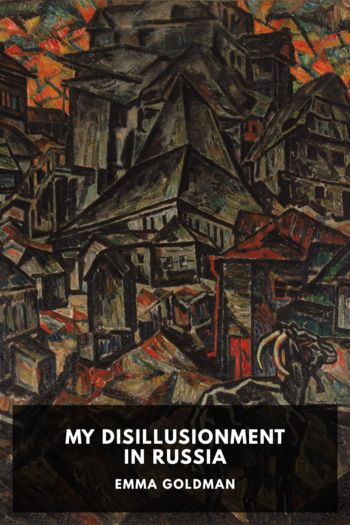My Disillusionment in Russia Emma Goldman (the beginning after the end read novel TXT) 📖

- Author: Emma Goldman
Book online «My Disillusionment in Russia Emma Goldman (the beginning after the end read novel TXT) 📖». Author Emma Goldman
Concentration Camp, Ryazan.
On the night of April 25th we were attacked by Red soldiers and armed Chekists and ordered to dress and get ready to leave the Butyrki. Some of the politicals, fearing that they were to be taken to execution, refused to go and were terribly beaten. The women especially were maltreated, some of them being dragged down the stairs by their hair. Many have suffered serious injury. I myself was so badly beaten that my whole body feels like one big sore. We were taken out by force in our nightclothes and thrown into wagons. The comrades in our group knew nothing of the whereabouts of the rest of the politicals, including Mensheviks, Social Revolutionists, Anarchists, and Anarcho-syndicalists.
Ten of us, among them Fanya Baron, have been brought here. Conditions in this prison are unbearable. No exercise, no fresh air; food is scarce and filthy; everywhere awful dirt, bedbugs, and lice. We mean to declare a hunger strike for better treatment. We have just been told to get ready with our things. They are going to send us away again. We do not know where to.
[Signed] T.
Upon the circumstances of the Butyrki raid becoming known the students of the Moscow University held a protest meeting and passed resolutions condemnatory of the outrage. Thereupon the student leaders were arrested and the University closed. The nonresident students were ordered to leave Moscow within three days on the pretext of lack of rations. The students volunteered to give up their payok, but the Government insisted on their quitting the capital. Later, when the University was reopened, Preobrazhensky, the Dean, admonished the students to refrain from any political expressions on pain of being expelled from the University. Some of the arrested students were exiled, among them several girl students, for the sole crime of being members of a circle whose aim was to study the works of Kropotkin and other Anarchist authors. The methods of the Tsar were resurrected by his heirs to the throne in Bolshevik Russia.
After the death of Peter Kropotkin his friends and comrades decided to found a Kropotkin Museum in commemoration of the great Anarchist teacher and in furtherance of his ideas and ideals. I removed to Moscow to aid in the organization of the proposed memorial, but before long the Museum Committee concluded that for the time being the project could not be realized. Everything being under State monopoly, nothing could be done without application to the authorities. To accept Government aid would have been a deliberate betrayal of the spirit of Kropotkin who throughout his life consistently refused State assistance. Once when Kropotkin was ill and in need, the Bolshevik Government offered him a large sum for the right to publish his works. Kropotkin refused. He was compelled to accept rations and medical assistance when sick, but he would neither consent to his works being published by the State nor accept any other aid from it. The Kropotkin Museum Committee took the same attitude. It accepted from the Moscow Soviet the house Kropotkin had been born in, and which was to be turned into a Kropotkin Museum; but it would ask the Government for nothing more. The house at the time was occupied by a military organization; it would require months to get it vacated and then no means would be at hand to have it renovated. Some of the Committee members felt that a Kropotkin Museum was out of place in Bolshevik Russia as long as despotism was rampant and the prisons filled with political dissenters.
While I was in Petrograd on a short visit, the Moscow apartment in which I had a room was raided by the Cheka. I learned that the customary trap had been set and everyone arrested who called at the place during the zassada. I visited Ravitch to protest against such proceedings, telling her that if the object was to take me into custody I was prepared for it. Ravitch had heard nothing of the matter, but promised to get in touch with Moscow. A few days later I was informed that the Chekists had been withdrawn from the apartment and that the arrested friends were about to be released. When I returned to my room some time later most of them had been freed. At the same time a number of Anarchists were arrested in various parts of the capital and no news of their fate or of the cause of their arrest could be learned. Several weeks later, on August 30th, the Moscow Izvestia published the official report of the Veh-Cheka concerning “Anarchist banditism,” announcing that ten Anarchists had been shot as “bandits” without hearing or trial.
It had become the established policy of the Bolshevik Government to mask its barbaric procedure against Anarchists with the uniform charge of banditism. This accusation was made practically against all arrested Anarchists and frequently even against sympathizers with the movement. A very convenient method of getting rid of an undesirable person: by it anyone could be secretly executed and buried.
Among the ten victims were two of the best known Russian Anarchists, whose idealism and lifelong devotion to the cause of humanity had





Comments (0)